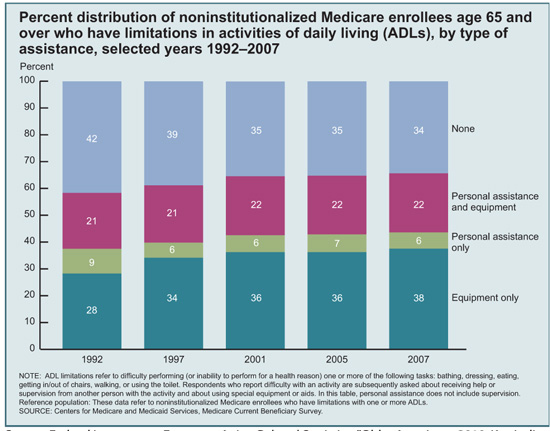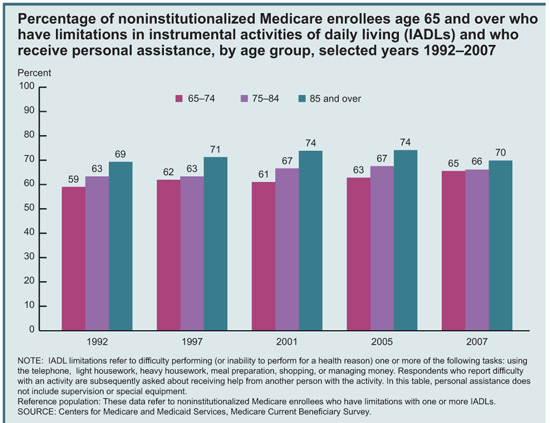 | | | Source: Federal Interagency Forum on Aging Related Statistics, "Older Americans 2010: Key Indicators of Well-Being" http://www.agingstats.gov/agingstatsdotnet/Main_Site/Data/2010_
Documents/Docs/OA_2010.pdf
| | | | | |
It happens to everyone at some point. Parents, once the invincible protectors of their children, grow old and become - "vincible." Steps become harder to climb, memories aren't quite as sharp, and bodies begin to wear down.
 It is when witnessing one of those moments that 40- and 50-something children begin to realize that cherished, traditional roles are beginning to reverse. Parents resist, not wanting to face their possible decline. Children delay - out of denial or a sincere desire not to hurt their parents' feelings.
It is when witnessing one of those moments that 40- and 50-something children begin to realize that cherished, traditional roles are beginning to reverse. Parents resist, not wanting to face their possible decline. Children delay - out of denial or a sincere desire not to hurt their parents' feelings.
 But avoidance, while perfectly human, is the worst thing we can do as families and friends. In reality, we should be prepared not only to care for aging relatives, but for life in general, which has a habit of throwing curveballs even when we're young. A 60-year-old golfer develops problems. A once-active sister who spent her life teaching physical education suddenly needs hip replacement surgery at age 58. Even one careless moment in a car in your early 20s, and you're Albert Brooks in the movie, "Defending Your Life."
But avoidance, while perfectly human, is the worst thing we can do as families and friends. In reality, we should be prepared not only to care for aging relatives, but for life in general, which has a habit of throwing curveballs even when we're young. A 60-year-old golfer develops problems. A once-active sister who spent her life teaching physical education suddenly needs hip replacement surgery at age 58. Even one careless moment in a car in your early 20s, and you're Albert Brooks in the movie, "Defending Your Life."
 The National Institute on Aging advises Americans to begin thinking early and calmly about the inevitable. "Decide who will be responsible for which tasks. Many families find the best first step is to name a primary caregiver, even if one is not needed immediately. That way the primary caregiver can step in if there is a crisis."
The National Institute on Aging advises Americans to begin thinking early and calmly about the inevitable. "Decide who will be responsible for which tasks. Many families find the best first step is to name a primary caregiver, even if one is not needed immediately. That way the primary caregiver can step in if there is a crisis."
 For those with aging parents with minor complaints who live close by, caregiving may be a hands-on experience or may involve the services of a homecare worker. For those with family far away, hiring a licensed professional geriatric care manager may be worth the expense to ensure peace of mind. The U.S. Administration on Aging's Eldercare Locator (www.eldercare.gov) provides a search tool for qualified professionals.
For those with aging parents with minor complaints who live close by, caregiving may be a hands-on experience or may involve the services of a homecare worker. For those with family far away, hiring a licensed professional geriatric care manager may be worth the expense to ensure peace of mind. The U.S. Administration on Aging's Eldercare Locator (www.eldercare.gov) provides a search tool for qualified professionals.
 Finding a physician trained in geriatrics is also critical. Many family doctors may not realize that certain medications which work well for a 40-year-old can put elderly patients at risk for falls or altered thinking.
Finding a physician trained in geriatrics is also critical. Many family doctors may not realize that certain medications which work well for a 40-year-old can put elderly patients at risk for falls or altered thinking.
 Then, stay engaged. A parent with burns or bruises may signal a problem, but so may withdrawal from daily interactions with friends. This could be a sign of depression - or of verbal mistreatment by a caregiver. Report suspected abuse immediately to the appropriate authorities, and contact your loved one's physician for help.
Then, stay engaged. A parent with burns or bruises may signal a problem, but so may withdrawal from daily interactions with friends. This could be a sign of depression - or of verbal mistreatment by a caregiver. Report suspected abuse immediately to the appropriate authorities, and contact your loved one's physician for help.
 And be prepared that, as a son or daughter, you may not be able to avoid sending a parent to a nursing home. A parent's Alzheimer's diagnosis or one's own altered finances are unexpected, major game changers. Be realistic about how much you can do and what you are willing to do.
And be prepared that, as a son or daughter, you may not be able to avoid sending a parent to a nursing home. A parent's Alzheimer's diagnosis or one's own altered finances are unexpected, major game changers. Be realistic about how much you can do and what you are willing to do.
 When you receive recommendations for long-term care facilities for your parent or grandparent, says Molly Jones, administrator of the Rheem Valley Convalescent Hospital in Moraga, pop in and tour each beforehand. Are staff passionate and committed? Is the facility clean? Do residents appear to be well cared for? What types of activities will be provided to keep residents at their baseline?
When you receive recommendations for long-term care facilities for your parent or grandparent, says Molly Jones, administrator of the Rheem Valley Convalescent Hospital in Moraga, pop in and tour each beforehand. Are staff passionate and committed? Is the facility clean? Do residents appear to be well cared for? What types of activities will be provided to keep residents at their baseline?
 "The feel of the nursing home is so important," muses Jones, whose own skilled facility won an award last year for its commitment to quality. She says it's vital to get in and observe operations at different times of the day, and even encourages families to bring loved ones for lunch and to speak with current residents. "My building is small," she says. "All the families know each other."
"The feel of the nursing home is so important," muses Jones, whose own skilled facility won an award last year for its commitment to quality. She says it's vital to get in and observe operations at different times of the day, and even encourages families to bring loved ones for lunch and to speak with current residents. "My building is small," she says. "All the families know each other."
 And if you have a feeling that something is off, trust your gut. Don't like a doctor's bedside manner or decisions? Get a new doctor. Don't like the quality of care? Work with your parent's primary doctor to find a different facility. Families do have power.
And if you have a feeling that something is off, trust your gut. Don't like a doctor's bedside manner or decisions? Get a new doctor. Don't like the quality of care? Work with your parent's primary doctor to find a different facility. Families do have power.
 Above all, make sure you and your loved ones have written wills and advance care directives in place. According to "Advance Directives and Advance Care Planning," a 2008 report from the U.S. Department of Health and Human Services, only 18 to 36 percent of adults have, historically, completed advance directives, and those "with serious medical conditions, a group for whom advance directives are particularly relevant, have completed advance directives at only a slightly higher rate. In spite of widespread efforts to promote advance care planning and advance directives, most end-of-life decisions emerge from the interactions of individuals, family members, and doctors, without formal advance care planning processes or advance directive documents."
Above all, make sure you and your loved ones have written wills and advance care directives in place. According to "Advance Directives and Advance Care Planning," a 2008 report from the U.S. Department of Health and Human Services, only 18 to 36 percent of adults have, historically, completed advance directives, and those "with serious medical conditions, a group for whom advance directives are particularly relevant, have completed advance directives at only a slightly higher rate. In spite of widespread efforts to promote advance care planning and advance directives, most end-of-life decisions emerge from the interactions of individuals, family members, and doctors, without formal advance care planning processes or advance directive documents."
 Children may not think of parents, aunts or uncles, or grandparents as aging - but they are. Planning early helps everyone ensure that family members' last years together will be the best they can be.
Children may not think of parents, aunts or uncles, or grandparents as aging - but they are. Planning early helps everyone ensure that family members' last years together will be the best they can be.
 Jones suggests starting the dialogue soon with: "I know it's great right now...."
Jones suggests starting the dialogue soon with: "I know it's great right now...."
 Senior Health and General Advocacy Resources
Senior Health and General Advocacy Resources

 Advance Care Planning Conversation Guide - Coalition for Compassionate Care California:
Advance Care Planning Conversation Guide - Coalition for Compassionate Care California:
 http://coalitionccc.org/advance-health-planning.php
http://coalitionccc.org/advance-health-planning.php

 Assisted Living Community Evaluation Checklist - Assisted Living Federation of America:
Assisted Living Community Evaluation Checklist - Assisted Living Federation of America:
 http://www.alfa.org/alfa/Checklist_for_Evaluating_Communities.asp
http://www.alfa.org/alfa/Checklist_for_Evaluating_Communities.asp

 Home Away from Home: Relocating Your Parents - Family Caregiver Alliance:
Home Away from Home: Relocating Your Parents - Family Caregiver Alliance:
 http://www.caregiver.org/caregiver/jsp/content_node.jsp?nodeid=849
http://www.caregiver.org/caregiver/jsp/content_node.jsp?nodeid=849

 National Institute on Aging:
National Institute on Aging:
 - Elder Abuse: - Elder Abuse:
 www.nia.nih.gov/health/publication/elder-abuse
www.nia.nih.gov/health/publication/elder-abuse
 - Falls and Fractures: - Falls and Fractures:
 www.nia.nih.gov/health/publication/falls-and-fractures
www.nia.nih.gov/health/publication/falls-and-fractures
 - So Far Away: Twenty Questions and Answers About Long-Distance Caregiving: - So Far Away: Twenty Questions and Answers About Long-Distance Caregiving:
 www.nia.nih.gov/health/publication/so-far-away-twenty-questions-and-answers-about-long-distance-caregiving-0
www.nia.nih.gov/health/publication/so-far-away-twenty-questions-and-answers-about-long-distance-caregiving-0
 - Talking with Your Doctor: A Guide for Older People: - Talking with Your Doctor: A Guide for Older People:
 www.nia.nih.gov/health/publication/talking-your-doctor-guide-older-people
www.nia.nih.gov/health/publication/talking-your-doctor-guide-older-people

|

